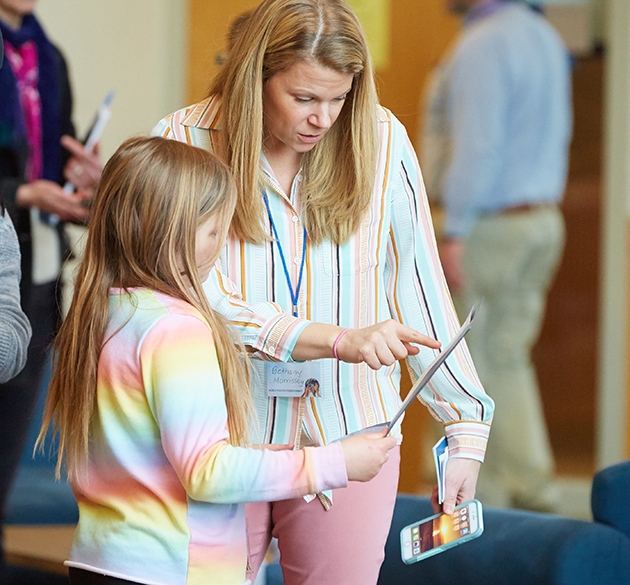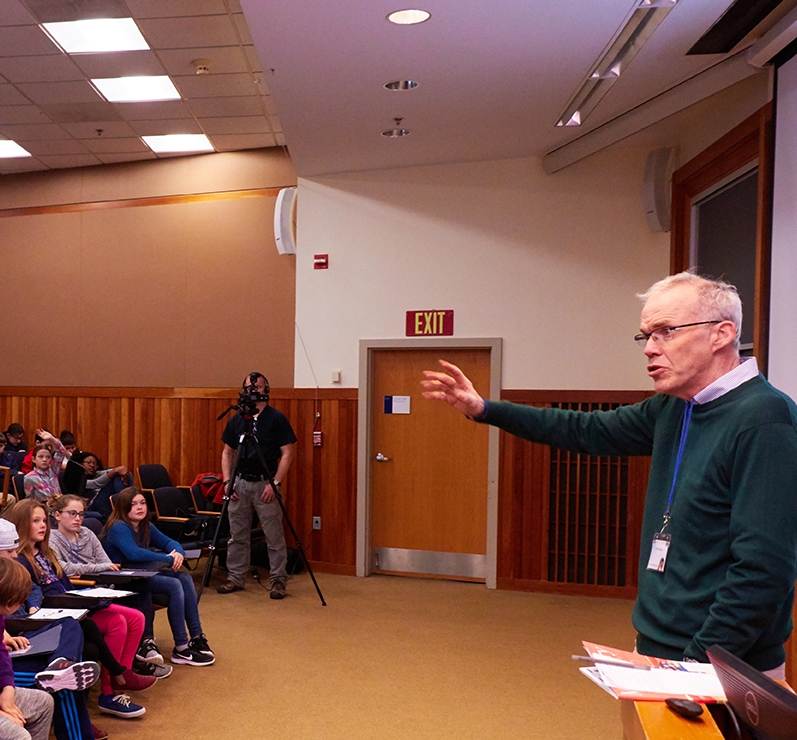Middlebury Students Share Their Cultures, Expertise, with Local Youth

MIDDLEBURY, Vt. – On a Friday in February, energy and curiosity filled Bicentennial Hall’s Great Hall at Middlebury College as about 120 local fifth and sixth graders buzzed around tables set up on one side of the room. Representing different countries, 15 Middlebury College students offered activities related to their native cultures or where they had studied abroad. The event, the Global Expo, was part of a daylong Youth Citizen Summit that the fifth- and sixth-grade teachers in Salisbury, Middlebury, Cornwall, and Ripton had organized as part of their schools’ conversion to an International Baccalaureate (IB) curriculum. Once the transition is complete, the Addison Central School District (ACSD) will be one of a very few K–12 districts in the country with an IB curriculum.
“Vermont is secluded so it’s great to have the College open itself up to the community for an event with an international focus,” said Pim Singhatiraj ’21.5, a Thai American who wants to be a teacher. She showed the students how to make a jump rope out of rubber bands, a popular activity among schoolchildren in Thailand.

The summit was the culmination of a unit the fifth- and sixth-grade students had been studying, titled “How Governments Protect and Deny Human Rights.” “Topics like this reflect the international perspective that the IB curriculum offers students,” said Bethany Morrissey, a fifth- and sixth-grade teacher at the Salisbury Community School who organized many of the day’s events.
“It was kind of shocking to me that some governments would hurt and harm their people,” said Emma Morrissey, a sixth grader, “and at the same time it was eye-opening—we have a really good situation in America.”
“The summit is a wonderful way for Middlebury students to share their knowledge with students in elementary school, and to learn more about the community,” said Kristen Mullins, coordinator of the Center for Community Engagement’s Language in Motion program at the College. “It’s also a reflection of the partnership between the ACSD and the College as the district adopts the IB curriculum.”
The young students had started the day by listening to opening remarks from environmentalist, writer, and Schumann Distinguished Scholar at Middlebury Bill McKibben, who shared photos of citizens from around the world demonstrating for environmental change. “Young people have an enormous amount of power,” he said. “Part of being a citizen in a democracy is to make your voice heard.”

The fifth and sixth graders spent much of the summit in workshops on a wide range of topics, from immigration and global laws to the court system and news. Leading the sessions were Middlebury students along with representatives from a variety of 10 state and local organizations, including the Vermont Humanities Council, Seven Days, 4-H, and Migrant Justice.
One workshop, “What’s the Verdict?,” created a mock trial. In a classroom set up as a courtroom, fifth and sixth graders acting as the jury listened as one of their fellow students on the witness stand answered questions from Middlebury-based lawyer Sarah Star, who was representing the defendant—a student charged with stealing a classmate’s iPad. Beth Robinson, who serves on the Vermont Supreme Court, acted as the judge.
“We had such a great response to the summit—everyone we asked to be involved agreed to participate,” said Morrissey.
Photos by Todd Balfour

